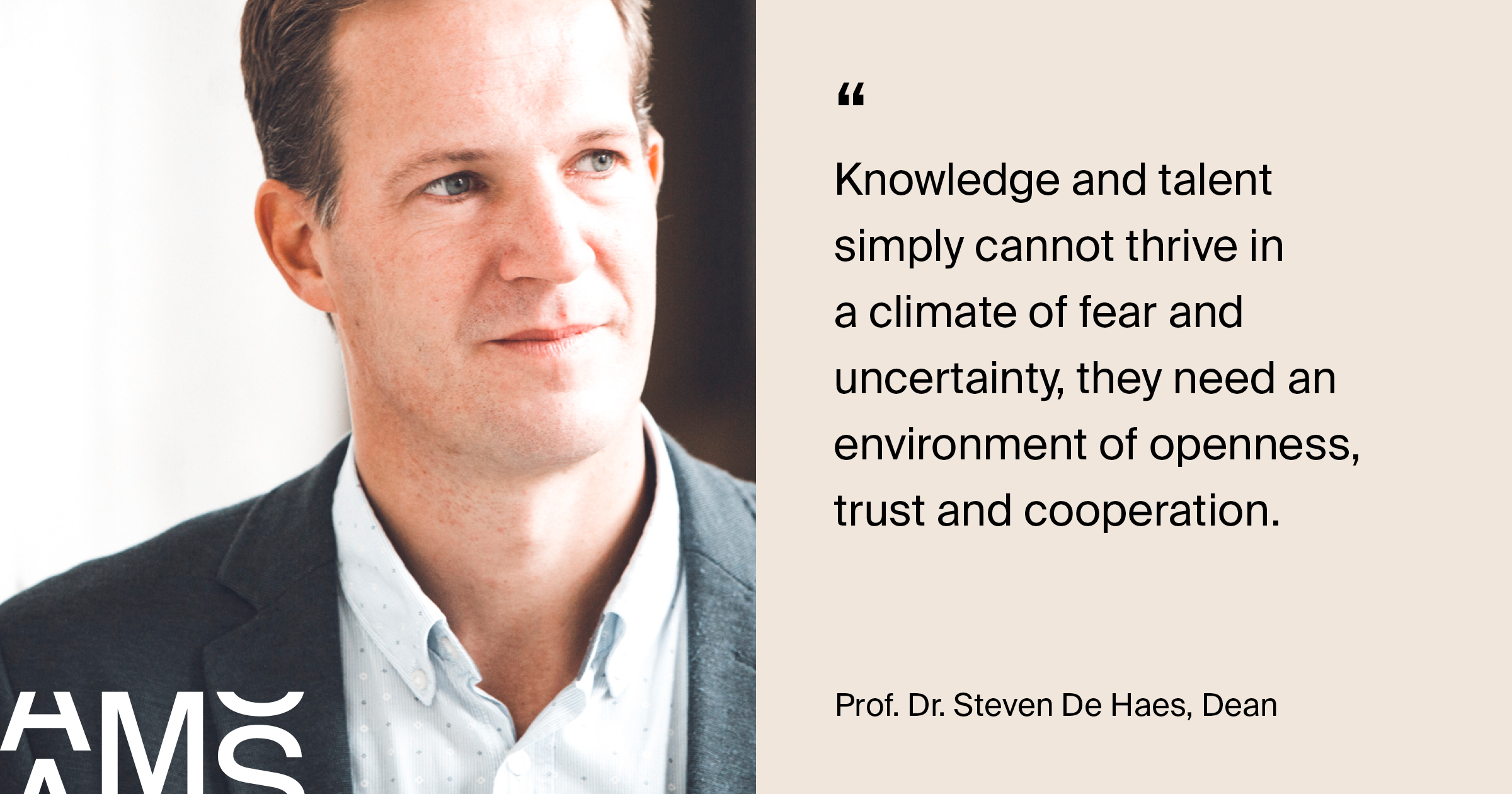After the first wave of the coronavirus crisis last summer, Antwerp Management School launched a joint call with leaders from the academic and the business world. A call to form a coalition that dares to invest in knowledge and talent, as these are our principal assets to make Flanders sustainable, attractive and resilient. Almost one year later, in the aftermath of the third wave of the corona crisis, we renew our call to take action together. Everyone realizes by now that the new normal is here to stay. Yet, there are still too many measures and initiatives inspired by fear. Although this may seem a natural reflex in these uncertain times, such an attitude may actually hamper Flanders’ recovery. We need to go from fear to embracing change, together.
This open letter was published in the Belgian Newspaper De Tijd on June 10, 2021
Toward a shared mindset of lifelong learning
If we want to boost knowledge, one of our key assets, we need to commit more than ever to building a culture of learning. For decades, lifelong learning has been the holy grail to make people, organizations and society resilient. Yet we are significantly lagging behind in Flanders, especially when it comes to offering an inclusive framework and learning throughout life. Despite all commendable upskilling and reskilling initiatives, many people still show resistance to, or a lack of interest in, lifelong learning, even in these times of crisis. This trend is even more outspoken among those who are most at risk of job loss due to, for instance, high seniority combined with digitalization.
We can only counteract this negative trend if we take responsibility at all levels and take steps forward in all areas at the same time. It is up to individuals to take control of their personal growth and career instead of waiting for the government or their employers. It is up to education to prevent young people from entering the workforce thinking that learning stops at the school gate. It is up to higher education, in particular, to reinvent itself and take on the role of lifelong learning partner. It is up to organizations to encourage their employees to explore new competencies and career paths. It is up to the government, together with academic research, education and the professional field, to focus on the competencies of the future and to pursue long-term policies. It is up to all of us to promote career mobility in and across organizations rather than imposing a strict framework. It is also up to all of us to provide additional support to vulnerable groups and to overcome the Matthew effect.

Making the most of our assets to win the international war for talent
When it comes to talent, we need a similar shift and coordinated action. In an international context, the war for talent is even more prominent than the war for knowledge. In addition, the negative impact of the coronavirus crisis is being felt more acutely in this regard, due to the closing of borders. However we must resist the reflex to delineate ourselves and invest in international talents to strengthen our organizations and society. In turn, our young people need better international and intercultural competencies to seize opportunities in our globalized world.
Again, this is a shared responsibility. It is up to education to focus on intercultural competencies and international learning experiences so that young people are prepared for this diverse world we live in. It is up to education to help build high-level international schools. It is up to organizations to facilitate the inflow of international students into the Flemish job market and to ensure that they feel at home once they work here. It is up to corporates with highly developed international programs to support SMEs in this. It is up to the government to stimulate mobility instead of imposing stringent language requirements. It is also up to the government to launch Flanders and its major cities as an open-minded, high-quality environment, e.g., through the concept of an international house that welcomes and supports international talents. It is up to all of us to promote our assets and success stories in view of increasing our international competitiveness.
When it comes to attracting foreign investments, we have no trouble joining forces. We must equally find each other in nurturing international talents and encouraging lifelong learning. This is the only way to achieve the general mind shift we need for a successful recovery of Flanders, Belgium and Europe. This is the only way to overcome fear and to make full use of the new post-pandemic opportunities. Knowledge and talent simply cannot thrive in a climate of fear and uncertainty, they need openness, trust and cooperation.
Steven De Haes
Dean Antwerp Management School
This open letter is co-signed by:
- Alain Beyens, Operating partner at Mid Europa Partners/Chairman of the Board of Directors AMS
- Chris Wuytens, Managing Director, Acerta
- Dirk Coorevits, CEO, Soudal
- Eddy Annys, Managing Director, Randstad Group Belgium
- Françoise Chombar, CEO /Chair Board of Directors, Melexis
- Griet Helsen, Partner, Entrepreneurial Business, Culture & Innovation, PwC Belgium,
- Prof. Dr. Herman Van Goethem, Rector, University of Antwerp
- Jan Remeysen, CEO, BASF Antwerp
- Jacques Vandermeiren, CEO, Port of Antwerp
- Jan Van der Goten, Head Janssen Beerse Campus & Strategic Partnership
- Johan Van Genechten, CEO, 4C Salesforce Consultancy
- Prof. Dr. Koen Vandenbempt, Dean Faculty of Business and Economics, University of Antwerp
- Michael Peeters, CEO, LAMMP
- Mimi Lamote, CEO, Mayerline Brussels
- Ilse Daelman, PhD, Managing Director AMS
- Prof. Dr. Ans De Vos, SD Worx Chair Next Generation Work – AMS
- Dr. J. André de Barros Teixeira, Faculty, and Associate Partner, Globalpraxis


